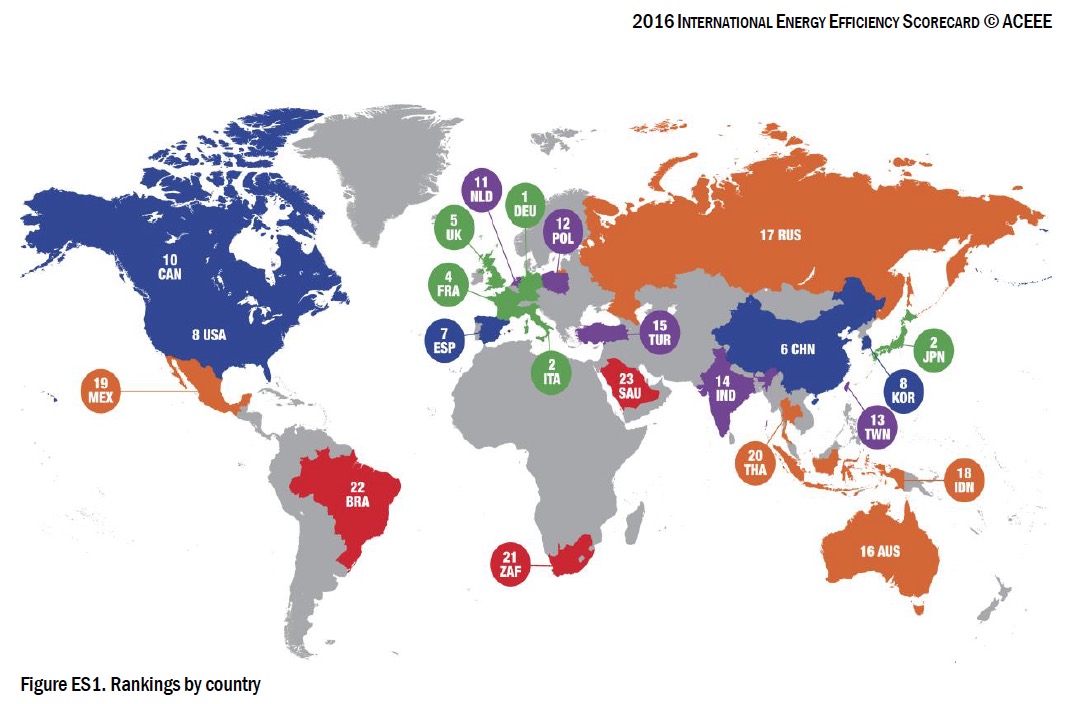AMERICAN COUNCIL FOR AN ENERGY-EFFICIENT ECONOMY (ACEEE)
Executive Summary
Energy efficiency is often the least-cost means of meeting new demand for energy. Governments that encourage investment in energy efficiency and implement supporting policies save citizens money, reduce dependence on energy imports, and decrease pollution. Yet energy efficiency remains massively underutilized globally despite its proven multiple benefits and its potential to become the single largest resource to meet growing energy demand worldwide.
The third edition of ACEEE’s International Energy Efficiency Scorecard examines the efficiency policies and performance of 23 of the world’s top energy-consuming countries. Together these countries represent 75% of all the energy consumed on the planet and over 80% of the world’s gross domestic product (GDP) in 2013. We evaluated and scored each country’s efficiency policies and how efficiently its buildings, industry, and transportation sectors use energy.
Compared to previous editions, this year’s Scorecard gives more weight to policy actions, with the point allocation split 60/40 between policy and performance. Policy metrics highlight best practices implemented by a country, such as national energy savings targets, vehicle fuel economy standards, or energy efficiency standards for appliances. Performance metrics measure energy use per unit of activity or service extracted, for example, the average on-road miles per gallon (mpg) for passenger vehicles or the energy consumed per square foot of floor space in residential buildings.
We evaluated each country using 35 policy and performance metrics spread over 4 categories: buildings, industry, transportation, and overall national energy efficiency efforts. We allocated 25 points to each of these 4 categories and awarded the maximum number of points for each metric to at least 1 country.
Germany earned the highest overall score with 73.5 out of 100 possible points, followed closely by Italy and Japan, tied for second with 68.5 points. Germany scored the most points in the national efforts, buildings, and industry categories, while India tied with Italy and Japan for first place in transportation. The lowest-scoring country was Saudi Arabia with 15.5 points. Brazil and South Africa rounded out the bottom three, although with significantly higher scores of 32.5 and 33 points, respectively (see figure ES1 below).
Our results indicate that there are substantial opportunities for improvement in all the economies evaluated in this report. The average score was just 51 points. Low-scoring developing countries such as Brazil, South Africa, Thailand, and Mexico have great potential to build energy efficiency into their continued economic growth by implementing policies in their industrial, buildings, and transportation sectors. Their more developed counterparts could lead by example and implement ambitious policies that will further reduce energy consumption.
The United States ranked 8th out of 23 countries. Its score improved to 61.5 points from 42 points in the previous edition, in part due to better performance in the national efforts and buildings categories. US progress toward greater energy efficiency has been aided by more stringent fuel economy standards for light-duty and heavy-duty vehicles, comprehensive tax credit and loan programs to encourage efficiency, and voluntary partnerships between government and industry. The United States has more mandatory appliance and equipment standards than any other country we evaluated, covering more than 60 product categories.
Nevertheless US energy efficiency still falls behind Germany, Japan, Italy, France, the United Kingdom, China, and Spain. The United States can make even more progress in implementing efficiency policies and reducing energy consumption. This report offers a number of policy recommendations toward that end.
Download full version (PDF): 2016 International Energy Efficiency Scorecard
About the American Council for an Energy-Efficient Economy (ACEEE)
aceee.org
The American Council for an Energy-Efficient Economy (ACEEE), a nonprofit, 501(c)(3) organization, acts as a catalyst to advance energy efficiency policies, programs, technologies, investments, and behaviors. We believe that the United States can harness the full potential of energy efficiency to achieve greater economic prosperity, energy security, and environmental protection for all its people.
Tags: ACEEE, American Council for an Energy-Efficient Economy, Energy efficiency, Scorecard







 RSS Feed
RSS Feed